I just realised I forgot to add the latest newsletter from Linda as previously promised.
Much love Marianne
Hard to believe it is the last gasp of summer and that the autumn equinox is
a mere 3 weeks away. We may be heading towards cooler weather but aren't the
plants looking great and they are growing at such an amazing rate it is
difficult to keep the nursery looking neat.
In the Nursery
Toddlers trundle (from 18 months to 3 years) on Saturday 9th March;
10h00 to 11h30 Talk about a blank moment - the wrong date on the
last newsletter for the toddlers trundle. I would like to confirm that it is on
Saturday 9th. Bring the little ones along for a morning of fun and
wonder.
Cost R50.00 (including parent / caregiver). Refreshment available
from Waterlily Tea Garden
Senior Citizens Tea and Talk (for the over 60's) on Thursday 14th
March; 10h00 to 11h30 Spend some quality time talking about
indigenous plants for tiny gardens and containers with Jeffrey and Jonathan
while enjoying tea and scones under the trees. We are offering a 10% discount
on all plants purchased and there will also be a lucky draw for a hamper of
goodies.
Cost: R30.00 incl. scones and tea
Easter
TreatsEaster Treasure Hunt for Children from
Saturday 30th March to Saturday, 6th April; Daily from 08h00 - 17h00
An Easter treasure hunt with a strong environmental theme. The
kids will learn about some of our fascinating indigenous flora as they discover
the answers to clues on your treasure hunt. At the end of the trail they will
receive a small gift and some sweeties.
Free of charge - No Booking
necessary
Saturday 30th March and Monday 1st April; 10h00 onwards - Easter High
TeaFrans and Yolam have a wonderful Easter-themed high tea on offer
in Waterlily Tea Garden on these two days. The selection of sweet and savoury
delicacies are sure to delight your palate!
Cost: Adults R110 per person,
R55.00 per child under 12
BOOKING ESSENTIAL - call David on 082-553-0598
Saturday 2nd March; 9.00 to 13.00 - Workshop onCreating Biodiversity
Gardens at Schools - A WESSA Eco-schools Green Flag Project 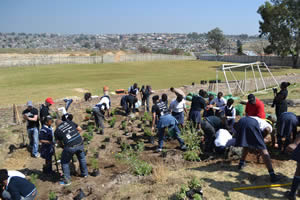
Random Harvest Indigenous Nursery is hosting a
talk and workshop on creating biodiversity gardens in school grounds. The
morning will cover a step by step process for educators to create gardens that
encourage our micro-wildlife to visit or take up residence in the school. Using
a biodiversity garden as a teaching and learning tool for various subjects
within the school curriculum will also be covered in the workshop.
The
workshop includes some take-home printed material. Additional resources will be
on sale during the tea break and after the workshop
Cost: R150 .00 includes
tea and info pack
BOOKING ESSENTIAL David: 082 553 0598
Saturday, 6th April 08h00 to 17h00 - Succulent Planting
DayCreate a succulent garden in a container - as large or as small
as you wish. A range of small succulents and accessories will be available, that
you can combine under supervision and with some advice if required. A lovely
family activity as it is for all ages. Bring your own container or choose from
our selection of pots.
Free. Items to be used charged
individually.
BOOKING ESSENTIAL David: 082 553 0598
Saturday, 13th and 20th April 09h00 to 12h30 - Mixed Media Workshop -
Part 1 and 2Decorate a picture frame with mosaicing items and bits
and pieces of memorabilia. We will provide the basics, but bring along anything
you would like to add to your frame to make it personal. No grouting necessary.
Proceed at your pace, and complete over one or two mornings.
R180.00 per
person per day incl. tea. R150 per day if booking both days
BOOKING ESSENTIAL
David: 082 553 0598
Saturday 11 May, 2013 all day - Mothers Day High Tea Let
Random Harvest Tea Garden help you spoil Mum with a delicious high tea in
idyllic surrounds. An array of sweet and savoury delights are sure to let her
know how special she is to you. Mums will also receive a free gift from Random
Harvest.
R110 per person. Children half price (R55.00)
BOOKING ESSENTIAL
David: 082 553 0598
Bird feeding station in the
garden
A bird feeding station in your garden will give you endless joy and
fascination as you watch the visitors and their endless antics and
squabblings.
There are a few points to remember for a successful feeding station.
You should provide as wide a range of foods as possible to attract the widest
number of species. Remember that birds such as your Robins and Thrushes scratch
on the ground for their food so some provision should be made for them as well.
A nice thick layer of mulch around the feeding station will do nicely for them
to scratch in.
A dense shrub planted next to the feeding station is vitally important as, if
the birds are alarmed, they have somewhere close by to hide until the danger is
past.
Provide water in the form of a grindstone that they can walk into and safely
bathe. There should also be some dense planting close by for shelter. A
Birdbath on a pedestal is nice for most of the birds but provision of water at
ground level is important for some birds as well as for lizards and other ground
living creatures.
We have a range of products to enhance your enjoyment of the birds from suet
balls for insect eaters to seeds and fruit feeders as well as peanut feeders and
fresh corn feeders.
Local plants to attract birds to the
garden.
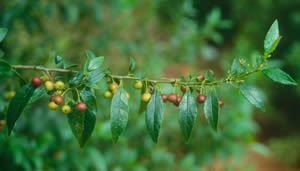 |
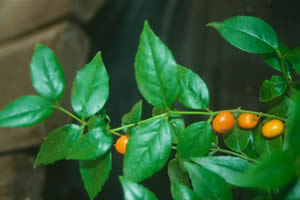 |
| Rhamnus prinoides (Dogwood) is probably one of the best berry
providers for fruit eating birds as it bears berries almost all year round. This
is quite a big and wild shrub and should be controlled in smaller gardens by
regular pruning. |
Cassinopsis ilicifolia (Lemon Thorn) is another great berry
providing plant. This shrub makes a beautiful container plant and can be trimmed
into an attractive hedge. Keep pruned in smaller gardens to contain the
size |
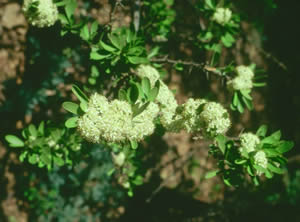 |
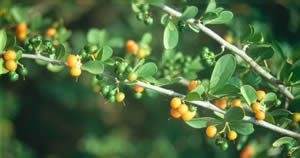 |
| Gymnosporia buxifolia (Common Spike Thorn) offers safe nesting
sites for the birds as well as a bounty of insects that visit the flowers and
the nutritious seeds for the onset of winter. |
Ehretia rigida (Puzzle Bush) this aptly named plant has numerous
stems that gracefully arch. It bears masses of lilac flowers in early spring and
these are followed by beautiful orange berries which offer a bounty to the birds
at the time they need extra energy for the start of the breeding season. Contain
the number of stems in smaller gardens. |
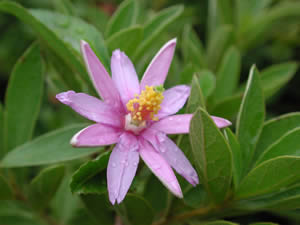 |
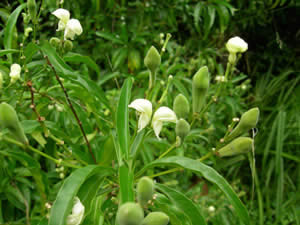 |
| Grewia occidentalis (Cross Berry) has delicious edible fruits
and gorgeous pink starry flowers almost all year round. Keep in shape with
regular pruning. |
Duvernoia aconitiflora (Lemon Pistol Bush)The nectar-laden
flowers of this attractive fast growing shrub attract Sunbirds and butterflies.
Plant in sun or semi shade. Flowers almost all year
round. |
Mulch

The best thing you can do for the birds in the
garden and your soil and plants is to put a generous layer of mulch onto the
soil once or twice a year.
Living within this layer of wood chips is a world of tiny insects that break
down the wood and provide free meals for your ground scratching birds. These
same insects burrow into the soil making tiny tunnels that aerate the soil and
help distribute the nutrients from the composting process of the wood.
Mulch also acts as a blanket to the soil and prevents the soil from freezing
and thus killing off all the tiny roots near the surface of the soil.
To save money why not collect from us by the trailer load at R185.00 per
cubic meter or by the bag at R19.95.
Plants that are looking good at the
moment.
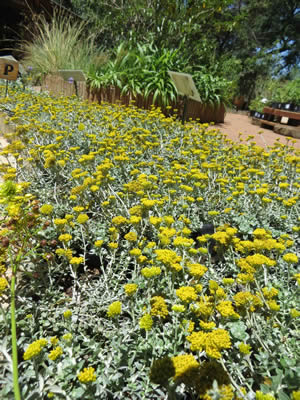 |
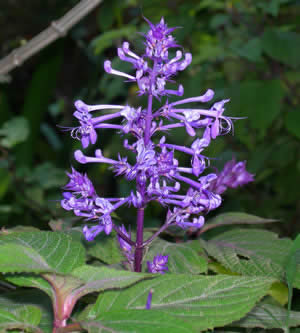 |
| Helichrysum cymosum (Impepho) has beautiful silvery leaves and
works well on banks or growing as a sub shrub under trees. |
Plectranthus species (Spurflowers) are coming into flower and
what a show they will give in March. The Plectranthus Mona Lavender are looking
particularly good at the moment. |
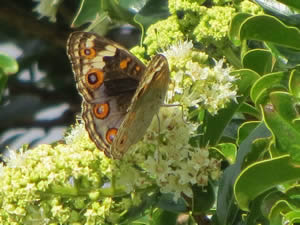 |
Not only are the flowers beautiful but they attract a whole host
of butterflies as well such as this Eyed Pansy which is sipping nectar from a
Galpinia transvaalensis (Wild Pride of India). |
Waterlily Tea Garden and Meeting and
Training Venue.
I thought I would give you a gentle reminder of what a great place the tea
garden is for a business breakfast or meeting place for friends for special
occasions.
The small conference venue is also getting more popular with all delegates
enjoying the ambience and the food. Mostly people do not want to have to go
home and back to the rat race. We can accommodate that wish as well in the Bed
and Breakfast cottages.
Please remember us next time you need a break or somewhere to meet.
On the farm
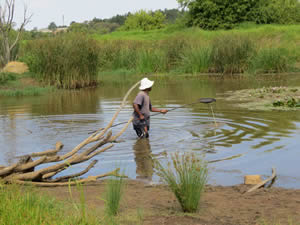
In my wisdom I decided to clean the dam and weed
around it.
The area now looks great but I was a bit ambitious with the cleaning around
the dam and destroyed some of the cover the baby Moorhens had been using.
After all my efforts to save them a Black Headed Heron managed to catch one
of them. I was really sad as the babies were almost grown.
This highlights just how careful you have to be when providing habitat for
wildlife.
I have certainly learned my lesson and will be more circumspect when dealing
with the habitat I have spent so much effort creating. One small misjudgement
and tragedy happens.
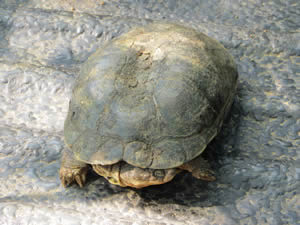
Jeff found this gorgeous little terrapin walking
along the road. I think he is a marsh terrapin.
This is a very widespread species, occurring in most parts of the country,
where slow-moving or still water is present.
They are often seen on land as they move from one water body to another. They
grow to about 20 to 30cm.
They are omnivorous, eating just about anything from water weed to frogs and
insects - even birds that they lie in wait for - ambushing them when they come
to drink.
We went and put him in the dam hoping he will move in and not move
along.
Although he will be making a hearty meal of the frogs. Everything we do has
its own consequences.
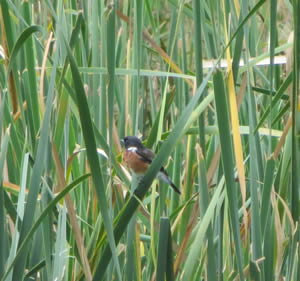
I was also really excited to see this little
African Stone Chat down at the dam. He is a really pretty bird.
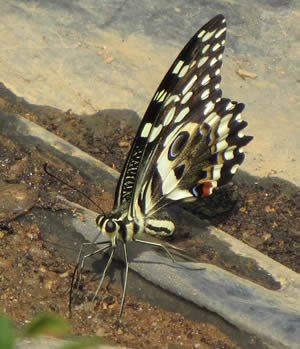
Jeffrey is getting really good with his
pictures. I was amazed to see the stripy body of this beautiful Citrus
Swallowtail butterfly so busy sipping at a little mud patch in the nursery.
Butterflies will readily make use of any place that they can take up
mineral-enriched liquid, particularly muddy or wet sandy areas such as the one
pictured.
Amazing just how beautiful nature is if you manage to capture a moment like
this.
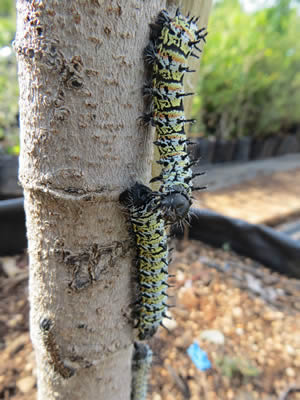
I think I have to be one of the only nursery
people in the world who gets excited when worms eat my plants.
Not only am I excited but I go and collect the worms that have left the tree
because all the leaves are eaten and put them onto a tree that has enough leaves
for them.
Totally weird for a nursery person.
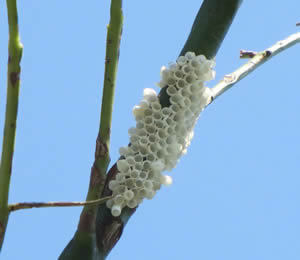
These mopane worms were on the Schotia
brachypetala (Weeping Boerbean).
I was also excited to find the empty egg cases.
The mopane worm is the larval stage of the Mopane Moth.
They feed on a wide range of plants, including Diospyros species, Rhus
species, Sclerocarya caffra, and Terminalia species.
The Schotia that they had stripped is already putting on new leaves so no
harm done and we got hours of pleasure just watching them. Cheap at the
price!
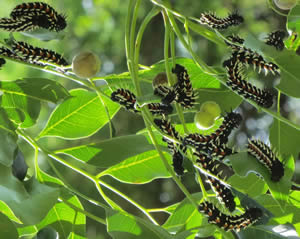
Not only are the Schotia getting eaten but the Ekebergia
capensis (Cape Ash) and Cussonia sp (Kiepersols) are also being eaten by the
larvae of the emperor moths.
You have to be vigilant to see what happens to these larvae. When they are
ready to pupate they all let themselves down on a string of silk together and
bury themselves in the soil to pupate in relative safety.
I have only managed to see this once.
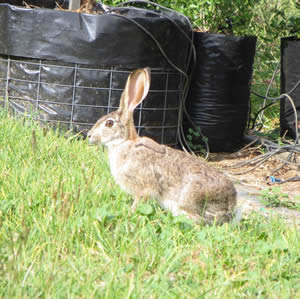
When I see things like this hare in the nursery
it is not only a joyful and exciting experience but it also confirms that we are
right not to use poisons that kill every living thing within their reach. So
what if a few plants have to be thrown away if they are unhealthy. What can
compare with sharing your life with the wildlife around you - no money can pay
for that.
I have been growing plants for years but they still manage to amaze me every
day. The forms and shapes are endless.
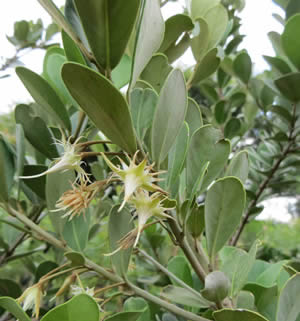 |
I have been growing Mimusops
obovata (Bush Red Milkwood) for years and this is the first time I have seen the
flowers and how strange they are - amazing! |
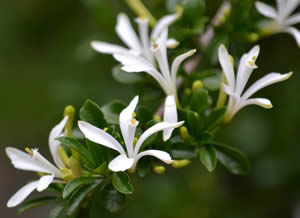 |
Years ago I managed to get
some seeds of Turraea obtusifolia (Small Honeysuckle Tree) and after much
patience I have the most beautiful plant in my garden. You can smell the
flowers from 15m away. It is mostly worth the wait to have a corner in the
garden where you plant slow growing plants which over time mature into beautiful
specimens. Hopefully I will now have some seeds to sow and share them with my
customers. |
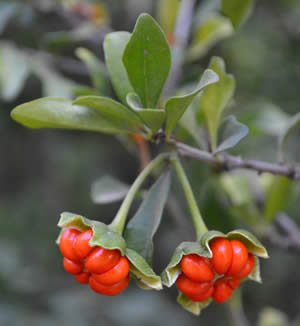 |
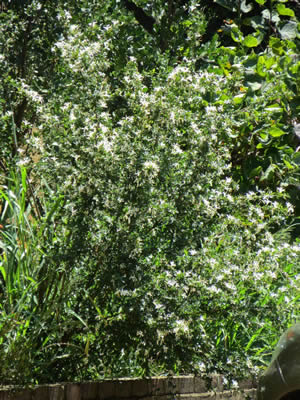 |
I was very excited to see a Fork Tailed Drongo sitting on the windmill in the
nursery. Another addition to our birding list.
I would also like to remind you that we are no longer involved with the
nursery at Walter Sisulu Botanical Garden. If you are looking for Random
Harvest quality plants and service you will have to visit us here in
Muldersdrift.
Cottage to Let
We have a lovely, large 2 Bed-roomed cottage to let here at Random Harvest so
if you know of anyone who would be interested please let them call my mom Rita
on 083-302-7370.
Take a few minutes out of each day and just sit and enjoy your garden - look
forward to seeing you here in the nursery.
Sincerely
Linda
















 Random Harvest Indigenous Nursery is hosting a
talk and workshop on creating biodiversity gardens in school grounds. The
morning will cover a step by step process for educators to create gardens that
encourage our micro-wildlife to visit or take up residence in the school. Using
a biodiversity garden as a teaching and learning tool for various subjects
within the school curriculum will also be covered in the workshop.
Random Harvest Indigenous Nursery is hosting a
talk and workshop on creating biodiversity gardens in school grounds. The
morning will cover a step by step process for educators to create gardens that
encourage our micro-wildlife to visit or take up residence in the school. Using
a biodiversity garden as a teaching and learning tool for various subjects
within the school curriculum will also be covered in the workshop. 






 The best thing you can do for the birds in the
garden and your soil and plants is to put a generous layer of mulch onto the
soil once or twice a year.
The best thing you can do for the birds in the
garden and your soil and plants is to put a generous layer of mulch onto the
soil once or twice a year.


 In my wisdom I decided to clean the dam and weed
around it.
In my wisdom I decided to clean the dam and weed
around it. Jeff found this gorgeous little terrapin walking
along the road. I think he is a marsh terrapin.
Jeff found this gorgeous little terrapin walking
along the road. I think he is a marsh terrapin. I was also really excited to see this little
African Stone Chat down at the dam. He is a really pretty bird.
I was also really excited to see this little
African Stone Chat down at the dam. He is a really pretty bird. Jeffrey is getting really good with his
pictures. I was amazed to see the stripy body of this beautiful Citrus
Swallowtail butterfly so busy sipping at a little mud patch in the nursery.
Jeffrey is getting really good with his
pictures. I was amazed to see the stripy body of this beautiful Citrus
Swallowtail butterfly so busy sipping at a little mud patch in the nursery. I think I have to be one of the only nursery
people in the world who gets excited when worms eat my plants.
I think I have to be one of the only nursery
people in the world who gets excited when worms eat my plants. These mopane worms were on the Schotia
brachypetala (Weeping Boerbean).
These mopane worms were on the Schotia
brachypetala (Weeping Boerbean). Not only are the Schotia getting eaten but the Ekebergia
capensis (Cape Ash) and Cussonia sp (Kiepersols) are also being eaten by the
larvae of the emperor moths.
Not only are the Schotia getting eaten but the Ekebergia
capensis (Cape Ash) and Cussonia sp (Kiepersols) are also being eaten by the
larvae of the emperor moths. When I see things like this hare in the nursery
it is not only a joyful and exciting experience but it also confirms that we are
right not to use poisons that kill every living thing within their reach. So
what if a few plants have to be thrown away if they are unhealthy. What can
compare with sharing your life with the wildlife around you - no money can pay
for that.
When I see things like this hare in the nursery
it is not only a joyful and exciting experience but it also confirms that we are
right not to use poisons that kill every living thing within their reach. So
what if a few plants have to be thrown away if they are unhealthy. What can
compare with sharing your life with the wildlife around you - no money can pay
for that.



